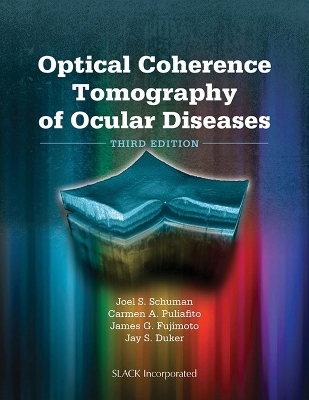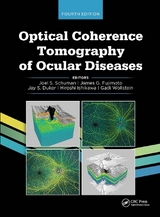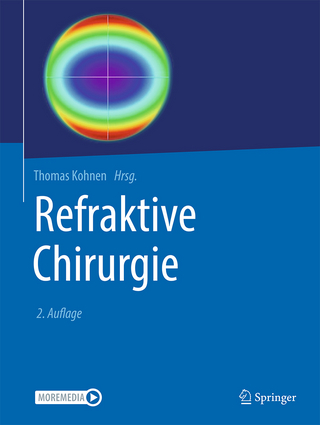
Optical Coherence Tomography of Ocular Diseases
SLACK Incorporated (Verlag)
978-1-55642-864-7 (ISBN)
This completely revised and updated Third Edition of Optical Coherence Tomography of Ocular Diseases reflects the quickly advancing technology of spectral domain optical coherence tomography (OCT).
Incorporated within over 600 pages are a multitude of updated features unique to this Third Edition including over 1,200 color images, state-of-the-art technology, and case presentations. These elements cohesively work together to successfully demonstrate the retina in normal and diseased states using spectral domain OCT.
Optical Coherence Tomography of Ocular Diseases, Third Edition is written with the clinician in mind. The text’s primary objective is to illustrate the appearance of the eye in health and disease, comparing conventional clinical technologies using spectral domain OCT imaging. This method introduces the clinician to the manifestations of disease as indicated by OCT, while presenting the more familiar fundoscopic and fluorescein angiographic views side-by-side.
Drs. Joel S. Schuman, Carmen A. Puliafito, James G. Fujimoto, and Jay Duker, together with their 17 contributors, have collaborated to revise and update this best-selling comprehensive resource to reflect the current state-of-the-art technology of spectral domain OCT.
OCT applications in retinal diseases, glaucoma, neuro-ophthalmology, anterior segment, and a description of OCT technologies are all topics extensively covered in this new Third Edition. Two appendices are included that contain a wealth of technical information for those interested in learning more about the physical principles of operation of this diagnostic imaging technology, as well as scanning and image processing protocols.
FEATURES:
Utilizes and interprets spectral domain OCT imaging from multiple machines.
Over 1,200 color images.
Strong focus on retina, glaucoma, neuro-ophthalmology, and the anterior segments.
This classic text will provide a clinical reference for eyecare professionals, as well as retina and glaucoma specialists, that shows how to utilize and interpret OCT imaging to enhance diagnostic sensitivity and specificity, as well as to enhance therapeutic decision making and monitor the outcome of treatment. This is the go-to resource for both clinicians and scientists interested in optical imaging of the eye.
Joel S. Schuman, MD, is the Eye and Ear Foundation Professor and Chairman of Ophthalmology, the Eye and Ear Institute, University of Pittsburgh School of Medicine, and Director of UPMC Eye Center. He is Professor of Bioengineering at the Swanson School of Engineering, University of Pittsburgh. Dr. Schuman and his colleagues were the first to identify a molecular marker for human glaucoma (Nature Medicine, 2001). The NIH has continuously funded him since 1995 as principal investigator of a grant to study novel glaucoma diagnostics. He is an inventor of optical coherence tomography (OCT). He has published more than 250 peer-reviewed scientific journal articles, 8 books, and more than 50 book chapters. In 2012, Dr. Schuman received a Carnegie Science Center Award. He shared the 2012 Champalimaud Award for the invention and development of OCT with James G. Fujimoto, David Huang, Carmen A. Puliafito, and Eric Swanson. Carmen A. Puliafito, MD, MBA, was appointed Dean of the Keck School of Medicine of the University of Southern California, May S. and John Hooval Dean’s Chair in Medicine, and Professor of Ophthalmology and Health Management in November 2007. Since his appointment, he has led the continuing transformation of the Keck School into one of the United States’ preeminent research-intensive medical schools. Dr. Puliafito is a renowned ophthalmologist, widely recognized for his innovative advances in treatment, including his co-invention of OCT. In addition to his responsibilities as Dean, he is an active clinician at USC’s Doheny Eye Institute and serves as the current editor of Ophthalmic Surgery, Lasers and Imaging. A cum laude graduate of Harvard College and a magna cum laude graduate of Harvard Medical School, Dr. Puliafito also earned an MBA from the Wharton School of the University of Pennsylvania. He shared the 2012 Champalimaud Award for the invention and development of OCT with James G. Fujimoto, David Huang, Joel S. Schuman, and Eric Swanson. James G. Fujimoto, PhD, is the Elihu Thomson Professor of Electrical Engineering and Computer Science at the Massachusetts Institute of Technology. Dr. Fujimoto’s group and collaborators are credited with the invention and development of OCT imaging in the early 1990s. He has published nearly 400 peer-reviewed journal articles and is coeditor of more than 10 books and coauthor of more than 20 patents. He is a member of the National Academy of Sciences, the National Academy of Engineering, and the American Academy of Arts and Sciences. Dr. Fujimoto cofounded the startup company Advanced Ophthalmic Devices, which developed OCT for ophthalmic imaging and was acquired by Zeiss. He is also cofounder of LightLab Imaging, which developed intravascular OCT and was recently acquired by St. Jude Medical. He shared the 2012 Champalimaud Award for the invention and development of OCT with David Huang, Carmen A. Puliafito, Joel S. Schuman, and Eric Swanson. Jay S. Duker, MD, is the Ophthalmologist-in-Chief at Tufts Medical Center, Director of the New England Eye Center, and Chairman of the Department of Ophthalmology at Tufts University School of Medicine. Dr. Duker has been at Tufts Medical Center for 20 years and previously served as Director of the Retina Service. A graduate of Harvard University and Jefferson Medical College, he completed his postgraduate training at Wills Eye Hospital in Philadelphia. His research interests include new treatments of vascular disease, intraocular drug delivery, and imaging of the posterior segment. He has been instrumental in the development of OCT.
Dedication
About the Editors
Contributing Authors
Preface
Section I Principles of Operation and Interpretation
Chapter 1 Introduction to Optical Coherence Tomography
James G. Fujimoto, PhD; Joel S. Schuman, MD; David Huang, MD, PhD; Jay S. Duker, MD; Carmen A. Puliafito, MD, MBA; and Eric Swanson, MS
• Introduction
• Imaging With Light Versus Sound
• Measuring Echoes of Light Using Interferometry
• Axial Scans and Optical Coherence Tomography Image Generation
• Optical Coherence Tomography Instrumentation for Retinal Imaging
• What Optical Coherence Tomography Images Show
• Ultrahigh-Resolution Optical Coherence Tomography and Detailed Retinal Structure
• High-Speed Spectral/Fourier-Domain Optical Coherence Tomography
• Advantages of Spectral/Fourier-Domain Optical Coherence Tomography
• Retinal Structure in Optical Coherence Tomography Images From Commercial Instruments
• Anterior Eye Structure in Optical Coherence Tomography Images
• Conclusion
Chapter 2 Interpretation of the Optical Coherence Tomography Image
Gadi Wollstein, MD; Lindsey S. Folio, MS, MBA; Jessica E. Nevins, BS; Hiroshi Ishikawa, MD; Carmen A. Puliafito, MD, MBA; James G. Fujimoto, PhD; and Joel S. Schuman, MD
• Introduction
• Interpreting Optical Coherence Tomography Images of the Normal Retina
• Interpreting Optical Coherence Tomography Images of the Normal Anterior Eye
• Optical Coherence Tomography Scanning and Imaging Protocols
• Quantitative Measurements of Retinal Morphology
• Interpreting Optical Coherence Tomography Images of Retinal Pathologies
• Quality, Artifacts, and Errors in Optical Coherence Tomography Images
• Conclusion
Section II Optical Coherence Tomography in Retinal Diseases
Chapter 3 Vitreoretinal Interface Disorders
Heeral R. Shah, MD; Elias C. Mavrofrides, MD; Adam H. Rogers, MD; Steven N. Truong, MD, FACS; Carmen A. Puliafito, MD, MBA; James G. Fujimoto, PhD; and Jay S. Duker, MD
• Idiopathic Epiretinal Membrane
• Vitreomacular Traction Syndrome
• Idiopathic Macular Hole
Chapter 4 Retinal Vascular Diseases
Heeral R. Shah, MD; Vanessa Cruz-Villegas, MD; Carmen A. Puliafito, MD, MBA; James G. Fujimoto, PhD; and Jay S. Duker, MD
• Branch Retinal Artery Occlusion
• Central Retinal Artery Occlusion
• Branch Retinal Vein Occlusion
• Central Retinal Vein Occlusion
• Bilateral Idiopathic Juxtafoveal Retinal Telangiectasis
• Retinal Arterial Macroaneurysm
Chapter 5 Diabetic Retinopathy
Heeral R. Shah, MD; Vanessa Cruz-Villegas, MD; Harry W. Flynn Jr, MD; and Jay S. Duker, MD
• Nonproliferative Diabetic Retinopathy
• Diabetic Macular Edema
• Proliferative Diabetic Retinopathy
Chapter 6 Central Serous Chorioretinopathy
Heeral R. Shah, MD; Elias C. Mavrofrides, MD; Carmen A. Puliafito, MD, MBA; James G. Fujimoto, PhD; and Jay S. Duker, MD
• Typical Central Serous Chorioretinopathy
• Chronic Central Serous Chorioretinopathy
• Bullous Central Serous Chorioretinopathy
• Laser Treatment for Central Serous Chorioretinopathy
• Central Serous Chorioretinopathy RTVue-100
• Photodynamic Therapy Treatment for Central Serous Chorioretinopathy
Chapter 7 Age-Related Macular Degeneration 1
Heeral R. Shah, MD; Elias C. Mavrofrides, MD; Natalia Villate, MD; Philip J. Rosenfeld, MD, PhD; Carmen A. Puliafito, MD, MBA; and Jay S. Duker, MD
• Drusen
• Adult Vitelliform Dystrophy
• Geographic Atrophy
• Occult Choroidal Neovascularization
• Vascularized Pigment Epithelial Detachment
• Retinal Angiomatous Proliferation
• Retinal Pigment Epithelium Tear
• Subretinal Hemorrhage
• Disciform Scar
Chapter 8 Miscellaneous Macular Degenerations
Heeral R. Shah, MD; Elias C. Mavrofrides, MD; Carmen A. Puliafito, MD, MBA; and Jay S. Duker, MD
• Pathologic Myopia
• Angioid Streaks
• Choroidal Neovascular Membrane
• Idiopathic Central Serous Chorioretinopathy With Choroidal Neovascularization
• Juxtafoveal Retinal Telangiectasis With Choroidal Neovascularization
• Presumed Ocular Histoplasmosis
Chapter 9 Chorioretinal Inflammatory Diseases
Heeral R. Shah, MD; Natalia Villate, MD; Elias C. Mavrofrides, MD; Janet Davis, MD; and Jay S. Duker, MD
• Idiopathic Retinal Vasculitis and Neuroretinitis
• Multifocal Choroiditis and Panuveitis
• Posterior Scleritis With Subretinal Fluid
• Sympathetic Ophthalmia
• Birdshot Chorioretinopathy
• Toxoplasmosis
• Intermediate Uveitis With Cystoid Macular Edema
• Sarcoidosis With Choroidal Granulomas
• Vogt-Koyanagi-Harada Disease
• Cytomegalovirus Retinitis
Chapter 10 Retinal Dystrophies
Heeral R. Shah, MD; Vanessa Cruz-Villegas, MD; Philip J. Rosenfeld, MD, PhD; Carmen A. Puliafito, MD, MBA; and Jay S. Duker, MD
• Retinitis Pigmentosa
• Stargardt’s Disease
• Best’s Disease
• Pattern Dystrophy
Chapter 11 Miscellaneous Retinal Diseases
Heeral R. Shah, MD; Elias C. Mavrofrides, MD; Vanessa Cruz-Villegas, MD; Carmen A. Puliafito, MD, MBA; and Jay S. Duker, MD
• Cystoid Macular Edema
• Rhegmatogenous Retinal Detachment
• Posterior Segment Trauma
•Optic Nerve Pit
Section III Optical Coherence Tomography in Glaucoma, Neuro-Ophthalmology, and the Anterior Segment
Chapter 12 Optical Coherence Tomography’s Clinical Utility in Glaucoma
Gadi Wollstein, MD; Lindsey S. Folio, MS, MBA; Jessica E. Nevins, BS; and Joel S. Schuman, MD
• Normal
• Structure-Function Correspondence
• Structure-Function Disagreement
• Structural Loss Suggests Future Functional Loss
• Utility of Imaging in Longitudinal Glaucoma Assessment
Chapter 13 Optical Coherence Tomography for Neuro-Ophthalmology
Carlos Mendoza-Santiesteban, MD; Matthew D. Lazzara, MD; and Thomas R. Hedges III, MD
• Proving Maculopathy That May Mimic Optic Neuropathy
• Optic Neuropathy in the Presence of Retinopathy
• Functional Loss of Vision
• Optic Nerve Swelling
• Vitreopapillary Traction
• Compressive Optic Neuropathy
• Optic Neuritis
• Toxic, Hereditary, and Nutritional Optic Neuropathy
• Conclusion
Chapter 14 Anterior Segment Optical Coherence Tomography
Bing Qin, MD, PhD; Yan Li, PhD; and David Huang, MD, PhD
• Introduction
• Optical Coherence Tomography Devices
• Interpretation of Corneal Images
• Angle Assessment
• Refractive Surgery
• Corneal Pathologies and Surgeries
Section IV Appendices
Appendix A Physical Principles of Optical Coherence Tomography
Bernhard Baumann, PhD; James G. Fujimoto, PhD; David Huang, MD, PhD; Jay S. Duker, MD; Eric Swanson, MS; Carmen A. Puliafito, MD, MBA; and Joel S. Schuman, MD
• Introduction
• Optical Interferometry
• Low-Coherence Interferometry—Measurement of Light Echoes and Axial Resolution
• Principles of Fourier-Domain Optical Coherence Tomography— Measuring Echoes in the Spectral Domain
• Transverse Spatial Resolution
• Image Acquisition Time and Axial Scan Densities
• Three-Dimensional Optical Coherence Tomography Imaging
• Image Analysis and Display
• Image Averaging
• Advances in Optical Coherence Tomography Technology
• ConclusionAppendix B Optical Coherence Tomography Scanning and Image-Processing Protocols Gadi Wollstein, MD; Lindsey S. Folio, MS, MBA; Jessica E. Nevins, BS;
Hiroshi Ishikawa, MD; Carmen A. Puliafito, MD, MBA; James G. Fujimoto,
PhD; and Joel S. Schuman, MD
• Line and Radial Scan Protocols
• Circle Scan Protocols
• Compound Radial and Concentric Circles Scan Protocols
• Three-Dimensional Cube Raster Scan Protocols
• Eye Motion Tracking
• Image-Processing Protocols
• Repeated Scan (Image) Averaging
• Segmentation
• C-Mode
• Circumpapillary Retinal Thickness and Retinal Thickness Map
• Optic Nerve Head
• Macula
• Progression Analysis
• Anterior Segment Optical Coherence Tomography Scan Protocols
Financial Disclosures
Index
| Erscheint lt. Verlag | 30.12.2012 |
|---|---|
| Zusatzinfo | Over 1200 colour images |
| Sprache | englisch |
| Maße | 216 x 279 mm |
| Gewicht | 2305 g |
| Themenwelt | Medizin / Pharmazie ► Medizinische Fachgebiete ► Augenheilkunde |
| ISBN-10 | 1-55642-864-2 / 1556428642 |
| ISBN-13 | 978-1-55642-864-7 / 9781556428647 |
| Zustand | Neuware |
| Haben Sie eine Frage zum Produkt? |
aus dem Bereich



